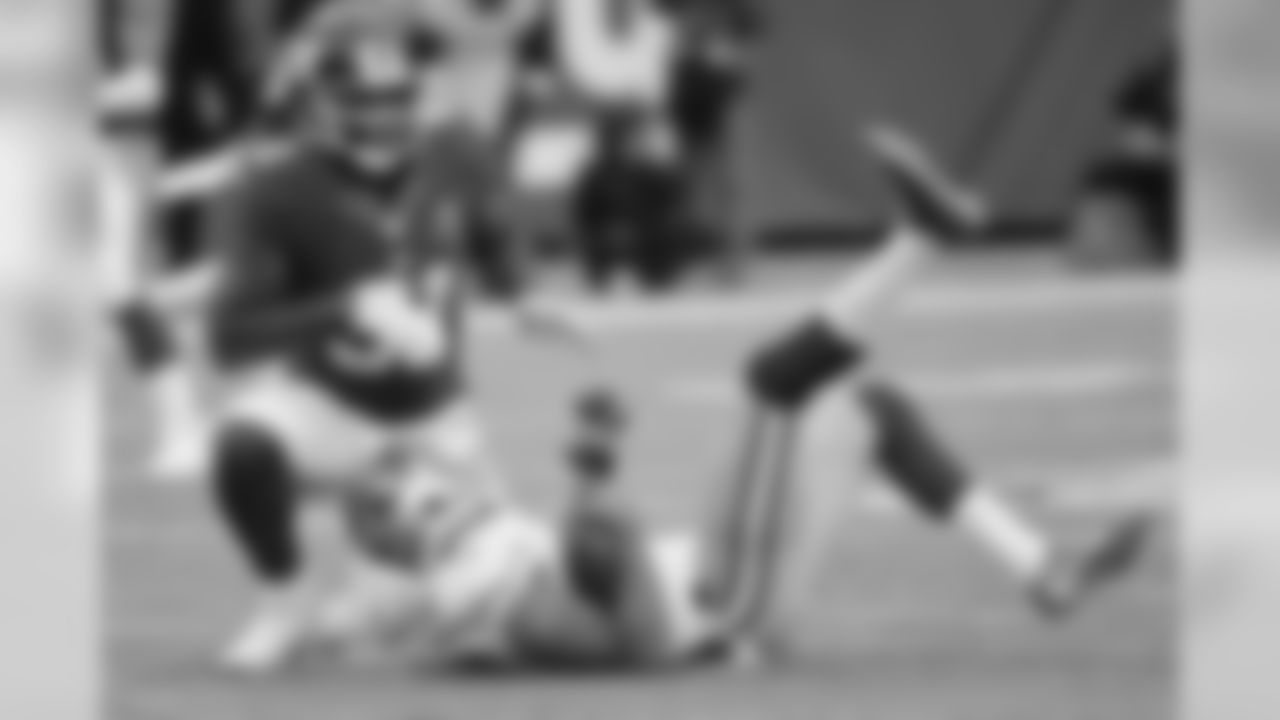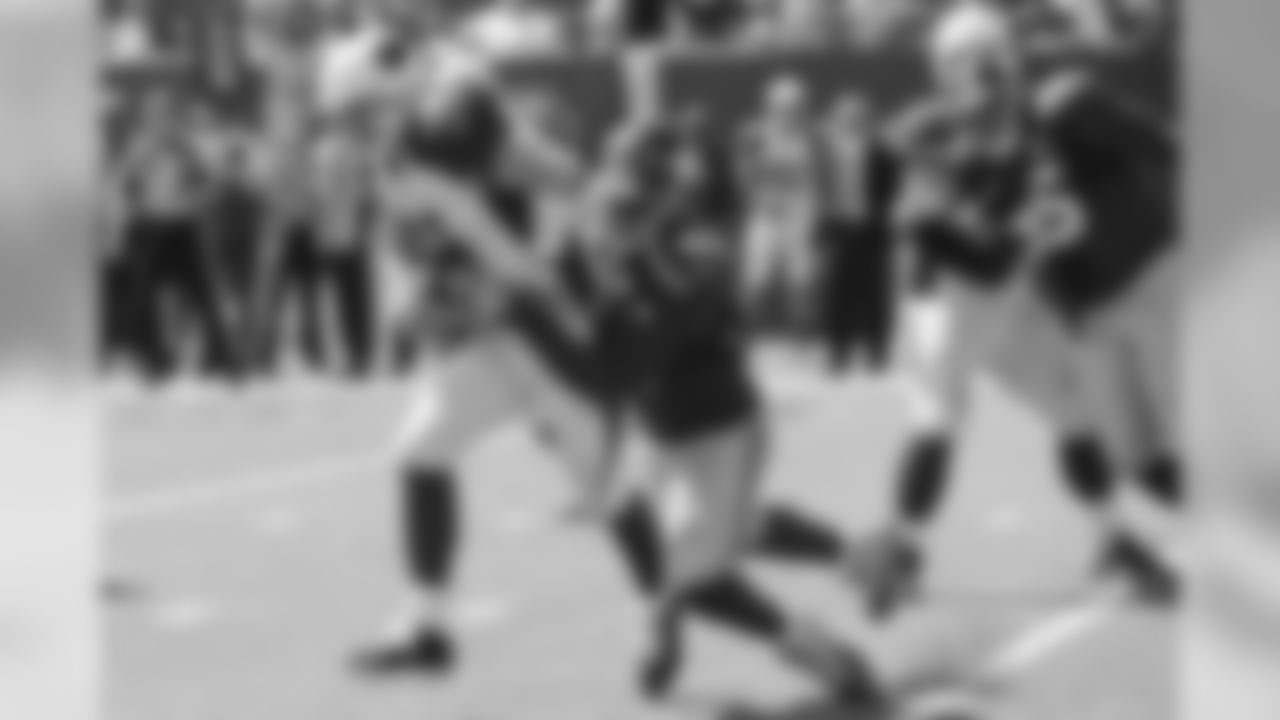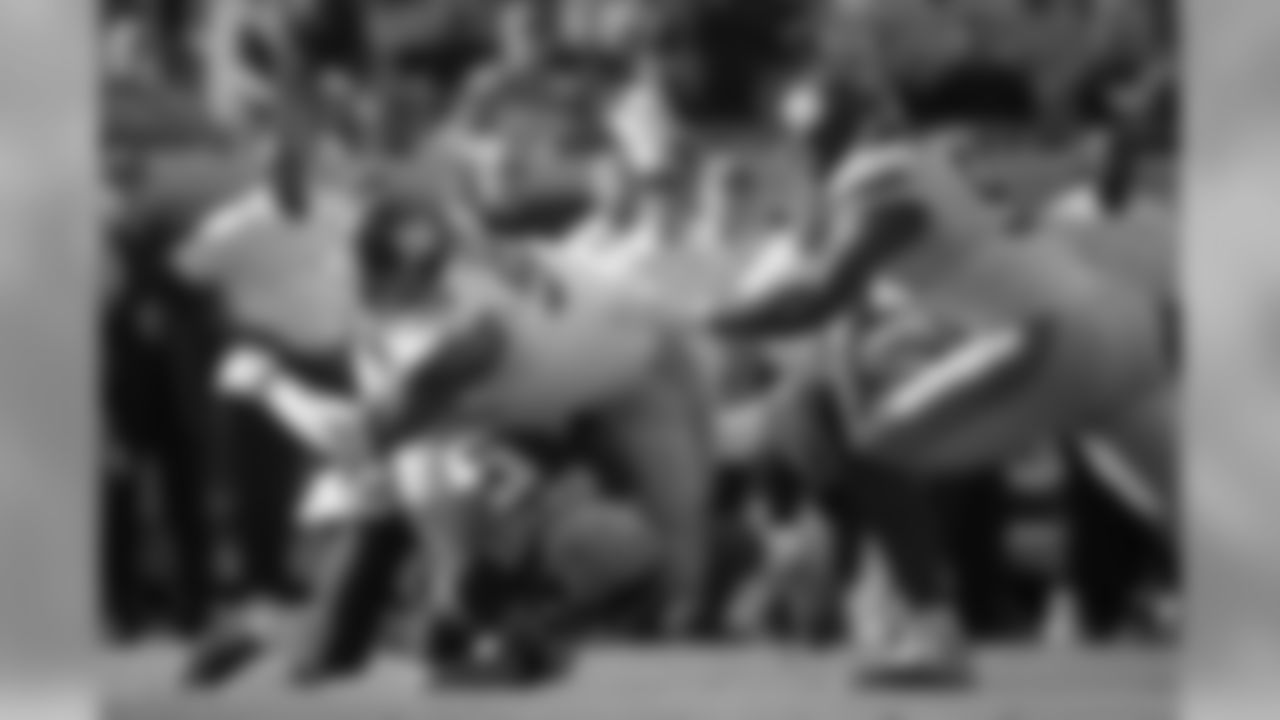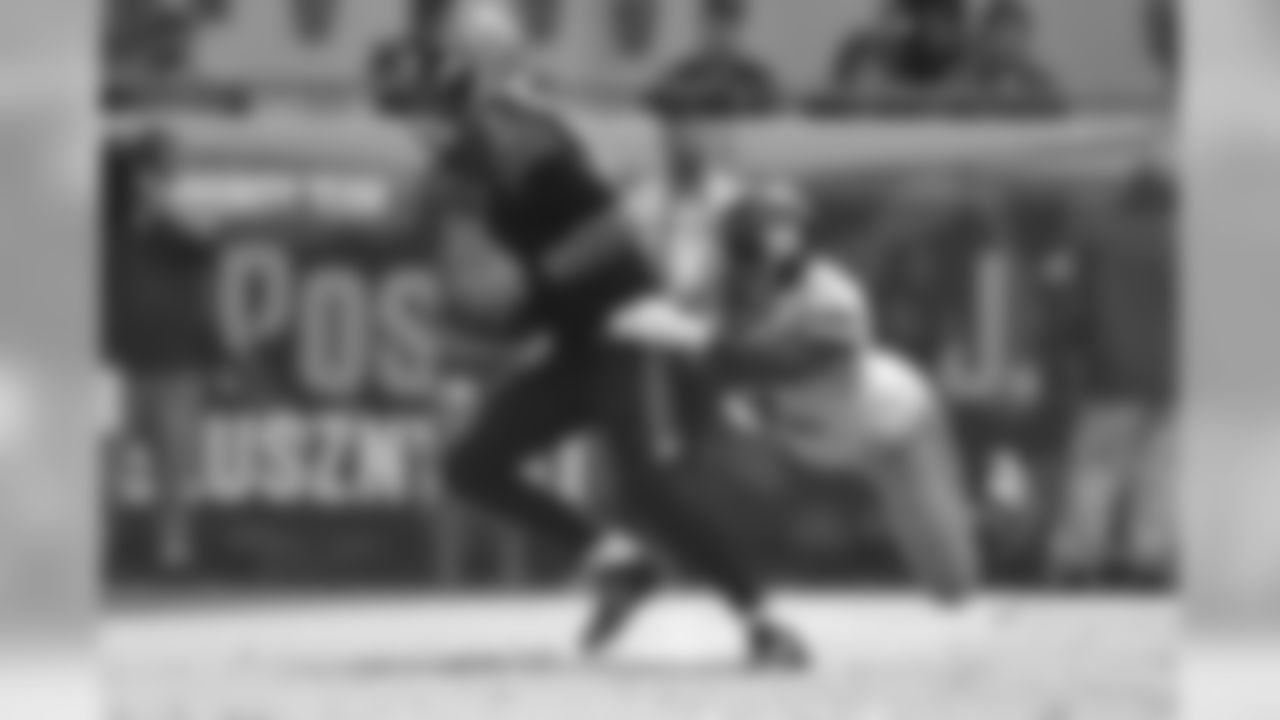**
Check out photos of DE Robert Ayers from the 2014 season










Q: Where did you live as a youngster? **
Ayers: "I lived in Jersey City and I played football at Hoboken High my freshman year, and then I moved to South Carolina in 2000. So I was up here from '85 to 2000."
Q: What memories do you have of growing up in this area?
Ayers: "Growing up around here basically defined who I am. I experienced a lot of things that, as a youngster, that a lot of other kids might have not been exposed to. It built my foundation. My father was a big influence in my life. My mother, they kept me on the right path. At times I strayed away. It was easy to fall into the temptations of this area, but my family did a good job of keeping me away from it. I learned a lot. They taught me how to keep a level head and how to stay focused and how to choose my friends wisely and make decisions. I have a lot of good memories from growing up in this area."
Q: What did your parents do when you were growing up?
Ayers: "My mother was working from job to job. My father, for about the first 10 years of my life, worked for Hoboken Wood Floors, delivering wood. He drove trucks. From when I was about nine or 10 until he passed away he drove for New Jersey Transit. That was his job until he died in 2012."
Q: Did you have siblings?
Ayers: "I'm the oldest of four. I have two brothers and one sister."
Q: Were sports a big part of your life when you lived here?
Ayers: "I played PAL football one year when I was maybe seven, but I never stuck with it. I played basketball at the Boys and Girls' Club, things like that. I took up boxing a little bit, but that was it for the most part. I really didn't do too much organized stuff. I played mostly street football; street stuff is where I mostly learned how to play sports - going to the local parks, playing street ball. We used to play from car-to-car, from this corner to that that corner or light to light in the streets. Those are my memories playing football. I was maybe 12, 13 years old, playing with older kids. Some adults played with us, too. We were just out there just playing. They would rough you up sometimes. I had some older cousins that would take me with them and they were a big influence in my life. That was basically my sports background, just street stuff, playing in local parks, me and a bunch of friends going, 'We've got next,' that type of thing. That was what defined me. Organized stuff really wasn't what was cool, I guess."
**
Q: How did you do in school? **
Ayers: "That's where I struggled. I wasn't always focused. As a child, sometimes you don't think about that. You just think you want to blend in. I was kind of class clown. I got in trouble a lot. That was the reason for my move from New Jersey to South Carolina. I was 15 and I got into a bunch of trouble in high school. I got kicked out of three schools in two years. Actually, I went to four schools in two years, so I was always getting into the wrong things. Like I said, my family did a good job of seeing potential in me that I didn't see in myself, and they let me move to South Carolina and live with my aunt. And the rest is history."
Q: Since you weren't really playing organized football, how did you play one year at Hoboken High School?
Ayers: "No, what happened was I was always in the streets playing. At the time we lived in an apartment - me, my brothers, my mother, my grandmother, a bunch of aunts and cousins. My cousins and my brothers and me would just go out and play in the street. My next door neighbor, I think his name was Rory Johnson, he just saw me out in the streets and he said, 'Man, you should look into this. You should start playing sports.' I was getting in trouble. His wife and my mother had a pretty good relationship and they would talk about it. He knew some guys at Hoboken High, because I think he played there, and he put me onto it. I went there and I played and I did pretty good. But I just wasn't level-headed enough. I was fighting and doing stupid stuff and I got kicked out of school. After that, yhey decided it would be best for me to move and I moved to South Carolina. Like I said, street ball was all I knew, just light pole to light pole in the middle of the street. Cars came by; we would stop and let the cars go by. That was just what we did. He saw that I was just as fast as the older adults, I was just as big, I was competitive, I didn't care who I was playing against. He just helped me get into Hoboken High and that sparked it. I have loved football since then."
Q: So you liked your first taste of organized football?
Ayers: "I did. My father was a big football guy and he was tough on me, to the point where I kind of resented football. I kind of resented organized stuff. I liked the freedom of being able to go out in the street and being able to do whatever I wanted to do, so I really didn't want to play organized ball. But when I went to high school, that's when I caught on."
Q: Who told you that you were going to move to South Carolina?
Ayers: "It wasn't that they made me. I was getting in trouble and I was fighting and then when I got kicked out of Hoboken High I went to Snyder High School and I wasn't going to class. I literally would just stay home all day. I would never go to school. My cousin, who was the same age as me, he and his mother had moved to South Carolina when he was like 11. He was down there by himself and he was going to high school and I had just got kicked out of Hoboken High. We were on the phone one summer and I was like, 'I'm going to come down there with ya'll.' He was like, 'Come on.' And then we talked and I talked to my mother, he talked to his mother and they agreed. That's just how it happened, just me and him joking."
Q: You moved there without your parents and siblings – that's a big move for a 15-year-old.
Ayers: "It was. It was the best thing that ever happened to me, because if I had stayed here I wouldn't have been smart enough or aware enough. I wouldn't have made it out of here. When I moved down there I literally was so bored that all I had to do was focus. So I picked up football, I ended up being real good and making All-State and All-American, all the other stuff, winning state championships. Moving out of here to South Carolina was really the best thing that could have happened to me."
Q: Were you a defensive lineman at Marlboro County High School?
Ayers: "I played other stuff. I returned kicks and played running back and receiver and all that stuff, but defense was my calling card. I wanted to do other stuff more than I wanted to play defense at the time. But when I got to college it was just defense. Everybody wants to catch the ball and score touchdowns."
Q: Did you get a little more serious about school when you got to South Carolina?
Ayers: "No, not really. I wasn't fighting as much. I wasn't in the streets hanging around the wrong people. There was nothing to do there, so I literally was bored and I occupied myself with all sports. I never was not in a sport. I played soccer, I wrestled some, I played basketball, I played football, I ran track. Every season I was doing something. That was my way of staying out of trouble. I was competitive, so that was how I managed to burn the time, because there was nothing else to do there."
**
Q: Do you have good memories of your time there? **
Ayers: "Oh yeah, definitely. I still talk to my best friend (Rob Brody), who graduated with me. When I moved there I met him and we're still best friends to this day. He's the godfather to my child. I still communicate with a lot of the guys and the coaches down there. I still have a lot of great memories from there."
Q: When did the college recruiters start showing interest in you?
Ayers: "Probably after my sophomore year. I started as a sophomore and we won a state championship. We went 15-0, we were like the number 11 team in the country, so we were a dominant team. Going into my junior year I was highly rated, so right after my sophomore year was when teams really started noticing me. I was a big, fast kid and I was only a sophomore. That's when they really started paying attention to me."
Q: Did you seriously consider other places than Tennessee?
Ayers: "I was planning on going to Florida. At the time they had (head coach) Ron Zook and I liked Zook. Charlie Strong was the defensive coordinator. One day, he pulled me to the side and said, 'Man, I don't know what's going to happen here.' The next year they all got fired. When he told me he didn't know what was going to happen I said, 'OK, I'm going to look at another school.' It was between Florida and Tennessee and I decided to go to Tennessee."
Q: Did you talk to your parents regularly when you were in South Carolina?
Ayers: "I would always talk to them. My father was up here, but since my first time playing football he would call me every day before the game. He always wished me luck. It's something he did before he passed. Before every game he called me, told me he loved me. He gave me some advice and sometimes I didn't need the advice. He coached me up a lot so that was the tradition. I always communicated with my family, my father, a lot of my cousins. They were still in my life. Then my mother and my brothers moved down to South Carolina my junior year."
Q: Were you originally a linebacker at Tennessee?
Ayers: "When I got to Tennessee I was at linebacker. But I had shoulder issues in high school, so when I got to college I had to get my shoulder fixed as soon as I got on campus. I had to redshirt because I had shoulder surgery."
Q: Did you move to defensive end after your redshirt year?
Ayers: "Yeah, after my redshirt year is when they moved me to end. When I got to college I was probably about 215 pounds. When I had my shoulder surgery I gained a lot of weight. I was up to like 245, 250 after that redshirt year and then they moved me to end. I've been there ever since."
Q: It wasn't until your senior year that you were a full-time starter. Was that frustrating?
Ayers: "It was, but once again, when I first got to college, I got in trouble. I got into a fight and I was suspended for a year from the team and that set me back. I didn't always get the picture. I wasn't going to class, I was getting in trouble. I was suspended from the team from fall until the beginning of the next season. I was suspended three games my redshirt freshman season, so I kind of started out in the doghouse. It took lot of maturing by me and a lot of me earning their trust again to get back in their graces. I was always playing. My junior year I led the team in sacks and tackles for loss, but I just didn't start. That kind of helped me, made me stronger, understanding how to stay focused with my back up against the wall and prove a lot of doubters wrong. They slighted me a lot, I felt like I should have been starting, but I wasn't. It taught me how to fight through those things. That's allowed me to fight through a lot of other things in life."
Q: Do you realize after that suspension that you couldn't keep messing up like that?
Ayers: "That's when I really straightened up. My first year I was all over the place, getting in trouble, I was hurt, I was depressed a little bit. I was mad at myself that I couldn't play and my shoulder was messed up. Then they moved my position, so I was real frustrated. After I got in that trouble, it was the first time I really saw my parents cry. They were sad and from that point on I was like, 'I don't want anyone talking about me.' I literally had people tell me to my face, 'You might as well drop out,' or 'Why are you at Tennessee, you should just quit, you can't make it there,' and that type of thing. People said that to my face and that motivated me, because I didn't want my family and my parents to deal with people saying things like that to them. I straightened up and I went on to make academic honors in school, I became a captain. That definitely was a turning point in my career."
Q: You started as a senior. When did you think you might be able to play in the NFL?
Ayers: "I think that was my issue when I first got to college. My father (Robert Sr.) put a lot in me. He never believed in letting me think that I couldn't do something. He never let me think that I wasn't capable. He always told me I could do anything I wanted to do. With him instilling that in me, I've always been extremely confident in myself. When I first got to college my thing was, 'Look, I'm going to the NFL.' That's what kind of got me behind. I was hurt, I couldn't play, so I'm mad at the world. I had a lot of anger in me. Once I came back I knew that if I worked hard that I could make it. I always felt that I would make it to the NFL. I never thought that not making it was possible. I knew that if I stayed focus and I worked hard, I would make it. My father put that extreme confidence in me. He never let me think that I could fail. That's why I am who I am today, because of him, the way he made me. To this day, I don't think I can be stopped. That's just how I think, because of how he is."
Q: The Broncos selected you 18th overall in the draft. Did you have any idea where you were going?
Ayers: "You kind of do. Some people give clues and hints, but you never know. You think it's possible to go here. I had some teams that were more interested in others and some teams that could have been, from what my agent told me. Then once you get to the league you hear other coaches say, 'Man, if you would have waited two more picks,' or that type of thing. Denver was definitely one of the teams that I knew was interested in me. I just didn't know if they were going to take me, when they were going to take me or if someone else would take me first."
Q: Why did you switch your jersey number from 56 to 91 after your second season?
Ayers: I was 91 in college and that was my number. But when I first got to the league coaches convinced me that 56 would be a better number for me, because I moved to linebacker. Another guy who I think was in his seventh season had 91, and I didn't want to be that rookie coming in trying to take people's numbers. So I took 56. When (coach) Josh McDaniels got fired I wanted a new start, I didn't want 56. He was the one that wanted me to have 56, so I went back to my old number."
Q: Do you remember your first NFL sack?
Ayers: My first sack was against… I can't remember."
Q: David Garrard in Jacksonville.
Ayers: "Yeah, yeah it was. The first game of the season my second year. It was on a spin move. I remember it now. My first career sack was that game, my second career sack was the next game and two games later I broke my foot. So that's how my sophomore year started. My first year I didn't have any sacks. Going into my second year I was killing it in the preseason. I had three sacks in the third preseason game against Pittsburgh, the second preseason game I had a sack. When the season started I had a sack. The second game I had a sack or a half-a-sack. The third game I had four or five TFLs (tackles for losses) and about nine tackles, got a game ball from the coach. Fourth game I broke my foot. I was out six weeks. I came back, never was the same and then coach got fired. So going into the third year we had new coaches and sometimes when you get new coaches, they want to do their own thing. That was the case."
**
Q: Overall, were your years in Denver a good time in your life? **
Ayers: "It definitely was. I still have some friends there. I definitely use things as motivation. I don't believe in being bitter or sour or holding a grudge. I feel like I was wronged in my life in certain things, but to me that's all motivation. There's no need to dwell on the past, but I always keep it in my mind. I'm the type of person that lets thing fuel me. I like to be mad about things. Now I know how to control it. Before, I had a lot of anger built up but now I know how to channel it into my effort, I know how to channel it into work. There are a lot of things that happened early in my career in Denver that I'm mad about, that I'm bitter about, but I don't let it hold me back. I just keep moving forward and keep working. It's motivation for me. Now I'm to the point where I've got a new start here and I'm loving it. I just want to keep getting better and keep improving and I want to start winning. That's my main focus here."
Q: Did you know the Super Bowl was going to be your last game with the Broncos?
Ayers: "I kind of did. As sad as it is, for all the wrong they did me I loved it there. I love winning. They were winning, it was a good team, so it was hard for me to let that go when I knew we were so close. I had some emotional ties with my father being attached to Denver. He passed the year before we went to the Super Bowl, which was in New Jersey. That was tough for me. In the back of my mind I kind of wanted to finished what I started for him, but that wasn't the case. I knew I needed a new beginning. I knew I had a glass ceiling there. I knew they didn't want me there. I knew they didn't see me in their future and I knew that since my third year, when the new coaching staff first got there. There were obstacles they made me jump through, hoops they made me jump through just to be on the team. I knew in the back of my mind and in my heart that it was my last time there. Even through all of that I still wanted to continue, because of my father."
Q: Aside from football, has it been fun for you to return to New Jersey?
Ayers: "It definitely I,s because growing up in the area, most of my family were Giants fans so they love it. One of my cousins, he was like a big brother to me, he got all emotional when I told him I was signing with the Giants. He didn't believe it at first. He loves it. It's good to see family around when you need someone to talk to or someone to go see, chill with, have a cookout or whatever and you get to see them whereas Denver I didn't get to see them all the time. It's definitely fun and it's definitely good to play for an organization that you grew up watching. They were always on TV when I was growing up. I remember seeing guys like Lawrence Taylor and Michael Strahan, who is one of my favorite players. To see those guys and now to play for the same organization that those guys did, it's kind of cool."
Q: A lot of free agents come here and they don't like the traffic around here, but I guess it's nothing to you because you grew up with it.
Ayers: "I definitely grew up with it. That doesn't mean I like it, though. It definitely gets on my nerves, but it is what it is. It's a great opportunity. Not too many people get to play for great organizations like that. I'm truly blessed to be able to play for two. Despite all of my things that I went through in Denver, they're one of the top organizations in the NFL, so I was blessed there. This is another one of the top organizations, so I'm definitely blessed. I count my blessings more than I think about the negative things."
Q: Are you married?
Ayers: Yes. My wife's name is Brandi Ayers. I have a daughter, Brailyn Ayers. She turned one on the 13th of November. That's my first child. I have another on the way. That's definitely another thing that motivates me a lot. I have my family and my wife and my daughter, all my brothers and sisters and my mom and her family. They're definitely my foundation."
Q: You're one of the few guys that have played with both Peyton and Eli Manning. What is similar and what is different about them?
Ayers: "They're definitely cool guys. They're real sarcastic with the things they say. Peyton, some of his jokes go right over your head sometimes. Peyton is more outgoing, he's a real alpha male. He's real hands-on with everything. Peyton builds a relationship with everyone in the organization. I played on defense, but he'll come up to me and talk to me about Tennessee, things like that. Eli, he's more straightforward, he's more eyes ahead, just chopping wood, working. He's not really that outgoing, alpha male type of person. But they're both great guys. You sit down and talk to either one of them you can definitely tell, 'Yeah, you guys are brothers.' You could see it when you have a conversation with them. Peyton is just more outgoing. He's more interactive with everyone while Eli kind of just stays in his own lane and works and keeps his head down and keeps chopping wood. You definitely see the similarities in their personalities when you talk to them."
Check out photos of DE Robert Ayers from the 2014 season















